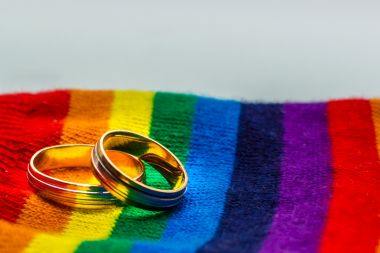More divided than the Conservative Party?
 Getty/iStock)
Getty/iStock)The vote at November's General Synod for standalone services of blessing for same-sex couples shows that the Church of England is now even more divided than the Conservative Party.
The divisions have clearly hardened since Synod voted to push ahead with the Prayers of Love and Faith (PLF) in February after the six-year Living in Love and Faith (LLF) consultation across the C of E on marriage, sexuality and gender.
At February's Synod just four bishops voted against the move with 34 in favour and two abstaining.
But on Wednesday 10 bishops opposed the implementation of the services with 23 in favour and four abstaining. The House of Bishops is now divided against itself.
Divisions have deepened in the Houses of Clergy and Laity too. In February, 111 clergy backed the services with 85 against and three abstentions. At November's vote, those in favour fell to 100 with 93 against and one abstention.
The vote among the laity this time was even closer with 104 in favour and 100 against and no abstentions. In February, 103 lay members backed the services with 92 against and five abstentions.
By coming out in favour of commending standalone services on a trial basis in his address to Synod on Monday, the Archbishop of York, Stephen Cottrell, rowed back from the House of Bishops' statement in the LLF paper circulated to members before Synod met, known as GS 2328. This said the bishops would not commend any standalone services unless they went through the full implementation route under Canon B2 of the C of E's rules, which requires a two thirds majority in Synod before new services can be allowed.
GS 2328 said categorically:
"These forms of (standalone) service will not be commended, but will follow the process for liturgical authorisation under Canon B2. Following the Canon B2 process for these services will provide the firmest footing for those using them within the shortest possible timeframe. It will provide reassurance concerning legal challenges, both for those who wish to use the prayers and for those who do not. It will also regulate the form in which this material can be used, and enable an opt-in approach to provide clarity and transparency about which churches have decided to offer them."
The bishops planned to allow parish clergy to conduct blessings for same-sex couples in existing services but the PLF liturgy would only be allowed to form part of a service such as Morning and Evening Prayer and Holy Communion.
In the run-up to the November meeting the holding motion which the House of Bishops published asking for synodical approval to "continue its work of implementation" on the blessings was looking shaky with revisionists angry at the delay over the standalone services, which would allow couples to have, in effect, gay wedding celebrations in church after civil marriage.
But Archbishop Cottrell's support for an amendment moved by the Bishop of Oxford, Steven Croft, to the holding motion seems to have appeased revisionist anger enough to get it over the line. Bishop Croft's amendment asked "the House (of Bishops) to consider whether some standalone services for same-sex couples could be made available for use, possibly on a trial basis, on the timescale envisaged by the motion passed by the Synod in February 2023".
The Croft amendment, like the main motion which incorporated it, served to show up the deep divisions in the established Church with 25 bishops supporting it, 16 against and no abstentions. Among the clergy 101 supported the amendment with 94 against and one abstention. It almost fell in the House of Laity, with 99 in favour, 98 against and two abstentions.
The Bishop of London, Sarah Mullally, the lead bishop on LLF (she has now stepped out of that role), told the media the bishops will commend the PLF liturgy for existing services in December and would reflect on how to implement the Synod's decision in favour of the trial standalone services. But after their trial period the standalone services still require a two-thirds Synod majority under the Canon B2 route the bishops have decided on for full authorisation. They have scheduled this vote for a Synod meeting in 2025.
Unless enough conservative opponents radically change their minds, there would not be a two-thirds majority in favour of standalone same-sex blessings. But the services would have become facts on the ground by then with parishes having started to host the celebrations amid all the congratulatory media coverage.
So, conservative members of General Synod would require real spiritual and moral courage to vote them down in 2025. But if the speeches from conservative members such as Benjamin John, Rebecca Hunt, Adrian Clarke and Daniel Matovu truly show the principled strength of the opposition, the celebrations may come to an abrupt stop in 2025, unleashing a tsunami of anger from the politically-correct establishment in Parliament and the mainstream media.
Julian Mann is a former Church of England vicar, now an evangelical journalist based in Lancashire. CT.
.jpeg)